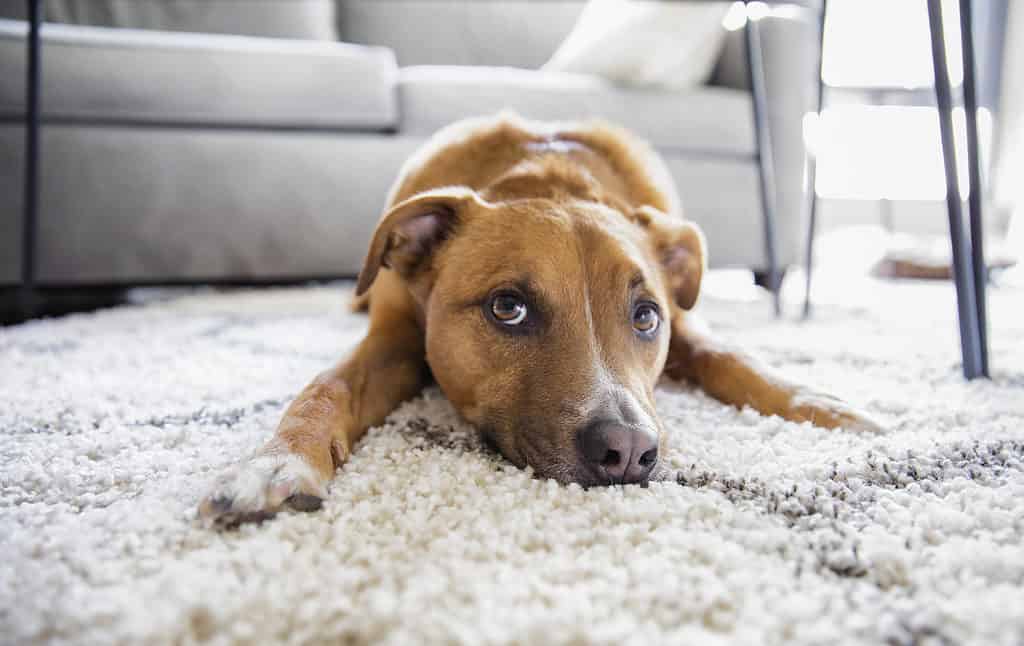No bond is quite like the one we share with our canine companions. This bond is so special that many of us cannot imagine a life without our pets. We wish there was a way they could live forever! Sadly, science has not yet figured out a way to make our dogs immortal. However, is it possible to clone dogs after they pass?
It turns out that it is possible to clone your dog. However, there are many important factors to consider before diving into the cloning process. We break down all the details, so you can be as informed as possible when it comes to canine cloning!
In this article, we discuss the cloning process, the average costs, the risks associated, and the ethics surrounding the topic! Let’s get started.
What Is Cloning Anyways?

A clone is an identical specimen created asexually in a lab setting.
©bezikus/Shutterstock.com
Before we dive into the details of the dog cloning process, let’s first discuss the definition of a clone. A clone is an identical specimen that is created asexually, meaning it is not the product of standard mating.
The cloning process involves using a single cell or organism to create an identical specimen. Scientists then place the embryo in a surrogate to develop further. The surrogate carries the identical specimen until it is fully developed, leading to a canine clone!
Have Dogs Been Cloned Before?
Not only have dogs been cloned before, but dogs are one of the most successfully cloned animals on record. Over 1,500 dogs have been successfully cloned as of 2022. Additionally, scientists are refining the procedure more and more each year.
One of the most famous cloned dogs in history is a stunning Afghan Hound named Snuppy. He held quite an impressive title throughout his life. Snuppy was the first ever dog to be cloned, and his DNA continues to pave the way for future cloning research!
What Happens When You Clone a Dog?

A cloned dog is not guaranteed to have the same personality as the original dog.
©N K/Shutterstock.com
Now that you know it is possible to clone a dog, you may wonder what the canine cloning process involves. Cloning a dog is an intricate process that requires the help of a skilled lab. Below, we break it down for any interested pet parents out there.
The dog cloning process begins by extracting cells from the dog you are attempting to clone. Most scientists will use skin cells from the cloning donor, but this can vary slightly from case to case. Once the cells have been extracted from the donor, the scientist extracts unfertilized eggs from a female canine patient.
The scientist then separates the DNA from the egg by removing the egg’s nucleus and inserts DNA from the donor in place of the removed nucleus. Electronic pulses are used to create the new cell. This pulse stimulates cell division, leading to a fertilized egg that can be implanted into a surrogate.
The scientist surgically implants the genetically modified eggs into a surrogate’s uterus. If all goes well, the surrogate will carry the cloned dog to term. Many scientists prefer planning a C-section to reduce the risk of any birthing complications. When all is said and done, a healthy clone is born!
How Much Does It Cost to Clone a Dog?
Nobody wants to envision a life without their beloved pup at their side. However, cloning is sadly unattainable for most people. ViaGen Pets in Texas is currently the main company that offers a dog cloning service, and the cost is currently $50,000.
You will need to be prepared to leave a $25,000 deposit to hold your pet’s space. Once your dog has been successfully cloned, you will then pay the remaining $25,000 balance. At this time, there does not appear to be any financing options available.
Are There Risks with Cloning a Dog?
There are two main risks that come along with cloning your canine companion. The first risk is major, considering the motivation to clone your favorite pet. The scientific team cannot guarantee an identical personality in the cloned dog.
The cloned pup will likely have an entirely different personality. Personality and behavior can be linked to genetics, but it is also influenced by environment and experiences. It’s impossible to duplicate the world in which your original pup grew up in, so your cloned dog could be vastly different based on life experiences.
The second risk is the possibility of the process failing. The cloning process is not guaranteed to lead to a viable egg. Furthermore, it is not guaranteed that your surrogate will carry the pregnancy to term. These are major risks to consider when so much time and money is involved.
Should You Clone Your Dog?
If you would do anything to keep your beloved companion around forever, you may be open to exploring the possibility of canine cloning. So, should you clone your dog? Here are a few things you should consider!
- Are you able to and comfortable with spending $50,000 on the process?
- Are you okay with the fact that your cloned dog may not have the same personality as the donor?
- Are you aware that the success of the cloning process is not guaranteed?
- Are you okay with using a surrogate dog to carry the pregnancy, and potentially covering the cost of a C-section?
If you have answered yes to the questions above, then you may be ready to dive into the cloning process! We suggest reaching out to ViaGen Pets, as they are the leading provider in canine cloning services in the U.S.
The photo featured at the top of this post is © Hana Hanigerova/Shutterstock.com
Ready to discover the top 10 cutest dog breeds in the entire world?
How about the fastest dogs, the largest dogs and those that are -- quite frankly -- just the kindest dogs on the planet? Each day, AZ Animals sends out lists just like this to our thousands of email subscribers. And the best part? It's FREE. Join today by entering your email below.
Thank you for reading! Have some feedback for us? Contact the AZ Animals editorial team.






